

Veterans Day is about more than honoring service; it’s about preparing leaders to serve in the military and beyond. For the 104th running of the New York City Veterans Day parade from atop the red carpet Host Fran Racioppi is joined by special guest co-host Drew Newkirk to navigate conversations through the motorcycles, the sirens, the marching bands and the floats. They kick off the parade with two of New York City’s most prominent veterans turned public servants; Commissioner James Hendon‘s a Reserve Army officer and leads New York City’s Department of Veteran Services.
Commissioner Zach Iscol served as a Marine, went on to found the Headstrong Project and now serves all New Yorkers leading Emergency Management. The Commissioners show us how to continue our impact post military service while leading our communities.
We’re also joined by Nick Angione and LTG(R) Mike Linnington. Nick’s the chairman of United War Veterans Council, the organization charged with producing the parade and bringing 25,000 people to the heart of Manhattan.
General Linnington is the CEO of the Wounded Warrior Project and was honored as the 2023 parade Grand Marshal. Nick breaks down the details of planning and hosting the largest veterans event in the country. LTG Linnington talks about the value that veterans bring to any organization and how hiring veterans isn’t a charity move, it’s a business decision.
Subscribe to us and follow @jedburghpodcast on all social media. Watch the full video version on YouTube.
—
Commissioner Hendon and Commissioner Iscol, welcome to the New York City Veterans Day Parade. The 104th running. We are sitting here a couple of minutes before the kickoff of it. This is Drew Newkirk, one of my good friends here in New York City. He works a lot on mental health. He’s the co-host for the Veteran’s Day Series. I’m honored to have him.
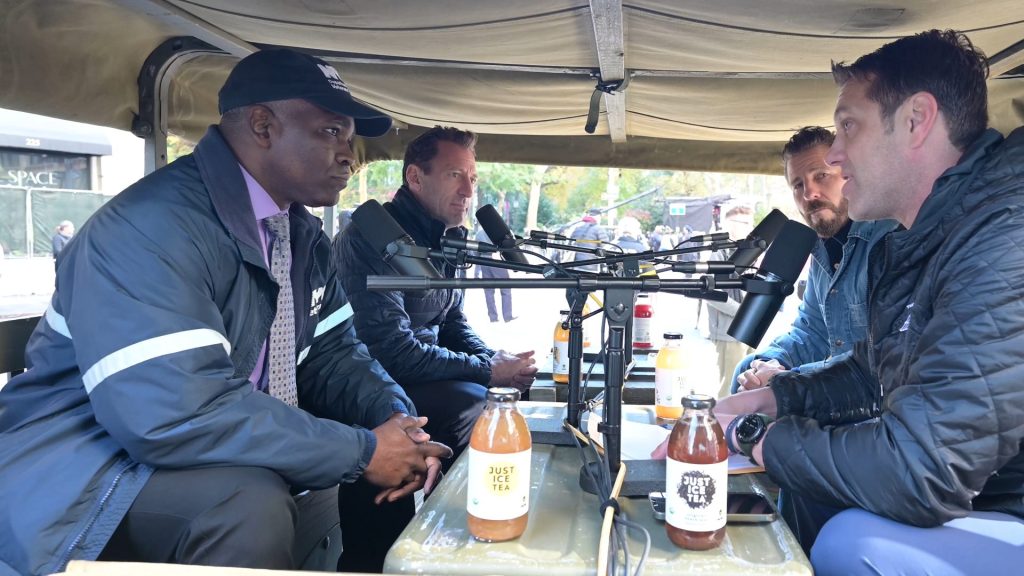
We are on the red carpet. We are right at the north end of the red carpet, 26th and 5th, the parade is going to kick off. Both of you gentlemen are so impactful in New York City when it comes to the Veteran Community. Commissioner Iscol, you were a Marine. Commissioner Hendon, you served in the Army a career there. Now you are in these public service roles here in New York City. If you can talk for a second about the importance of this parade, the importance of New York City in the veteran community, and why we do this 104 times and have never missed a year.
It’s a team sport to serve, protect, and defend this country to make sure that we have all the freedoms that a lot of folks take for granted, and I always run the numbers by folks. I say, “There have been over 540 million Americans since our nation’s founding. Of those 12 major wars, roughly 45 million have served. Of those, you have had 1.5 million have been wounded in action. You have 9,000 plus that are still missing in action between Korea, Vietnam, and even Iraq and Afghanistan. You have got 658,088 who have died between March 5th, 1770. That’s the Boston Massacre and the August 26th, 2021 and Kabul Airport bombing. As we look at all we have and how it’s born on the backs of so few, it’s so critical for us to give these people their roses out days like now.
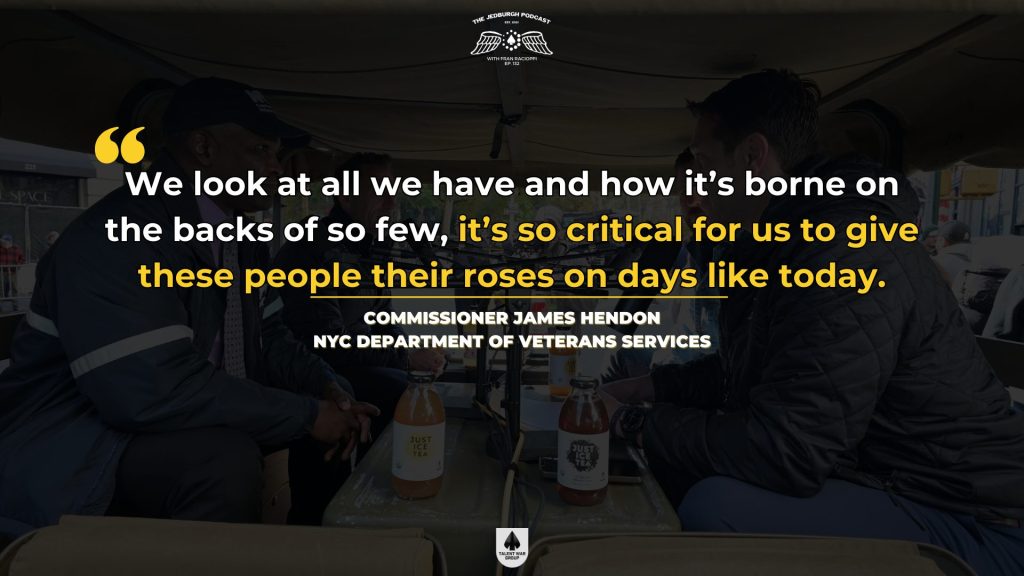
I couldn’t have said it better, this is such an important day to recognize service and thank people for their service, but also there’s a conversation that could take place about what else we could do with Veterans Day. Maybe turn it into a national holiday, turn it into election day. Maybe we get more people to vote around that and maybe tie that to the sacrifices people have made to give us that freedom to enable us to vote, so maybe we could elect more and even better-elected servants.
It’s an important point that you bring up here and I want to go there because our military is probably the premier outlet to develop leaders. We sit here at a time right now when our military recruiting is at an all-time low, especially over the last 20 to 30 years. The importance of developing leaders in the military is for their time in the military, but it’s for after, and you both have continued your service.
Go a little deeper on that. Why do we need veterans with the leadership experiences that they have to come into public service roles in cities like New York City? You lead the emergency management department. You have a tremendous amount of experience coming out of the Marines. Who better to sit in that role?
This is one of the things that I see a lot, and this is any industry. The nonprofit sector, Corporate America, and nonprofit America. We have a tendency in this country that when somebody is good at their job and good at making widgets, you then put them in charge of other people making widgets. Oftentimes, leading people to make widgets is not the same as making widgets. We need to have more of an emphasis on training managers, training leaders, and building leaders. It’s a completely different skillset.
There are a lot of ways to develop that skillset. The military is not the only way, but it is an incredibly effective way to learn the basic tenets of leadership. Namely looking out for each other, taking care of your people, and having more of a bottom-up approach. Those are all things that apply more broadly that any organization or the country would benefit not just from military leadership but from making those investments across the board.
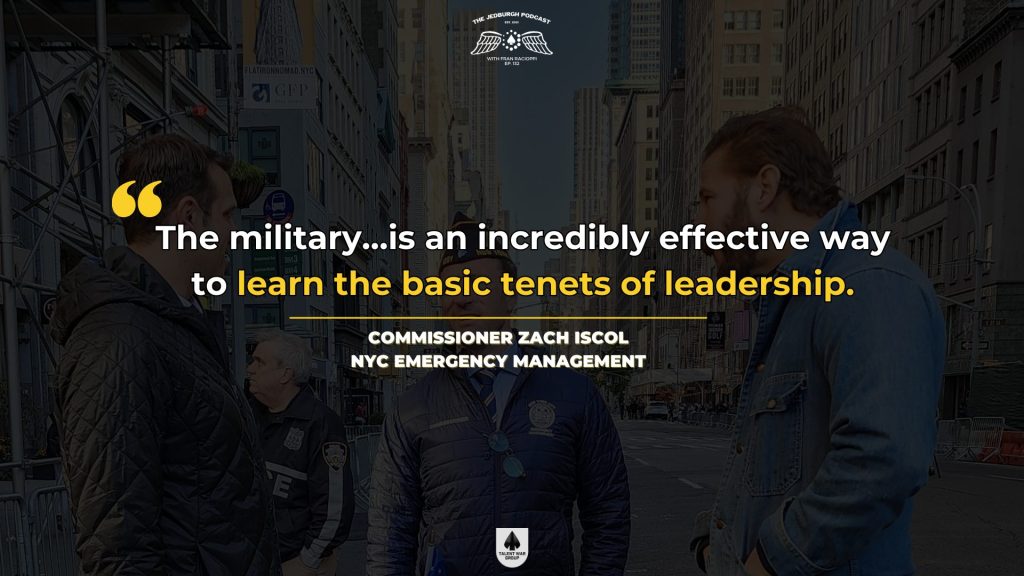
I have never told him this, but Zach is an example of this.
We’re all in a country where mental health is normal and accepted. It’s something people talk about. There are a lot of problems. There’s not enough capacity. We need more clinicians. We need to make it more accessible, but in a large part, the stigma has gone away. The huge reason for that is the leadership within the veterans community.
On that point, from my experience and from some of the people who are working with veterans that I know, they are taking mental health to the next level, especially with veterans, with plant-based medicine. Have you guys even touched that, started thinking about that, and talked about that yet? It does seem to be a revolution. I see that vets are on the front lines of that right now.
My thing with mental health, and this is something that I believe, is that there’s no panacea for mental health. If you have heart disease or cancer, there might be a few treatments that are effective. For mental health, you have to use what works for the individual and each individual has different needs.
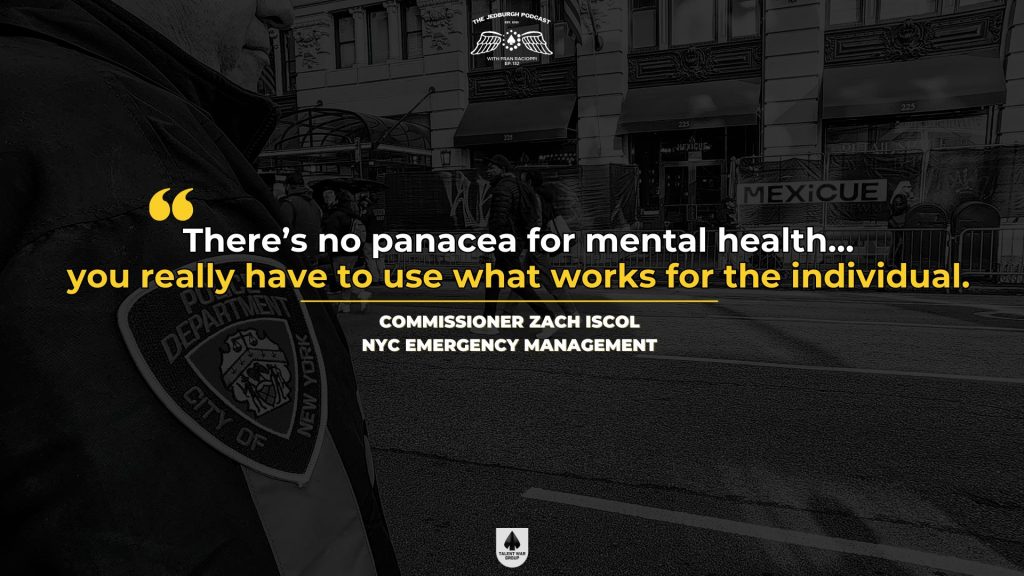
In that sense, it’s anything that works. Where I become skeptical is when somebody says, “This is the cure for PTSD.” It doesn’t exist. The plant-based stuff and psychedelics, whether it’s CBT or EMDR, whatever treatment that’s effective for that individual. At the end of the day, the thing that matters is having a qualified clinician who’s adept at using whatever the right treatment modality is for that individual and who can adjust the treatment to the needs of the individual. That’s what’s important. In that sense, I know that there’s a lot of work that’s going on with plant-based stuff, with psychedelics, and with other innovative therapies that I’m all for.
You said one of the difficulties is getting those clinicians. In general, for my friends and family, the first question is, “Who can you refer?” There is a very small percentage that is the tip of the spear. Are there solutions that you see there?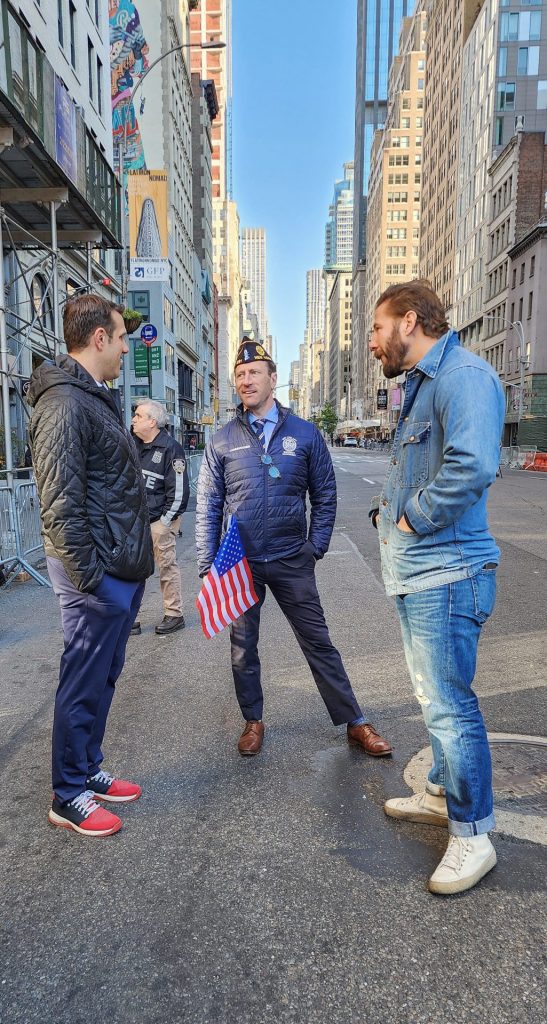
We have to have a real investment in developing more clinicians, putting people through the career pathways, opening up opportunities for them to get the training and the stuff that they need. The one other thing I wanted to mention while we were talking about it in terms of alternative forms of therapy, whether it’s using different types of drugs, MDMA, or psychedelics.
I think that there is a line between self-medication and doing something as a part of a treatment protocol. One of the things that you run into with folks is like, “I heard MDMA is great.” Yeah, if you are working with a clinician, but if you are just going out there and using drugs, that’s self-medication and that is a dangerous road to go down.
I want to attack this from a different angle as well. I think about these things. In New York City, only about 24.2% of our veterans self-identify. We spoke about this last time. For me, a part of the riddle also is how we get more of our brothers and sisters to come into the light. Nationally, it’s 33.6% per the VA’s gross expenditure reporting information. It’s 24.2% here. How do we get more folks to come into it?
Including all the things that were discussed, for us, it’s also trying to get these opportunities down to democratize opportunities to help our brothers and sisters at the lowest level and get funding. New York has a Joseph P. Dwyer fund. It’s money that is given to us that we work as New York City Veteran Services to get out to our veterans groups to create opportunities for folks to come into the light and have wellness activities.
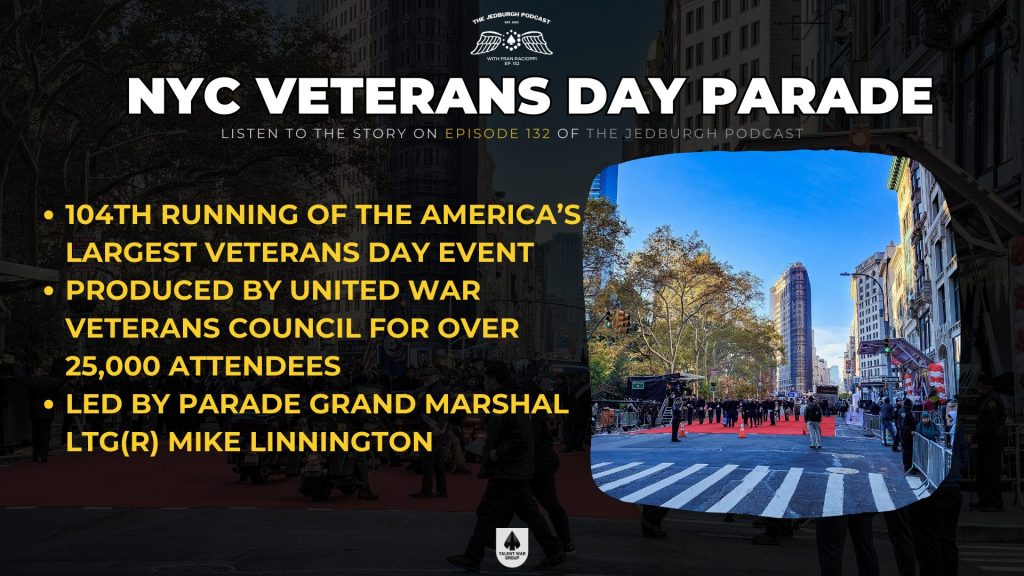
That’s one piece, and then on the science aspect, to add to the portfolio you guys discussed, we think New York City being the home of the Columbia protocol as far as the questions that are asked to someone to try to triage things when they are thinking about suicide or RTM treatment or Reversing Traumatic Memories, and protocols.
It’s another thing in the kick-back of things to try to throw at PTSD as far as what works best for folks. We are trying to socialize among our mental health practitioners, how is it that you should best deal with a veteran? Tying in with SAMHSA, the Substance Abuse Mental Health Services Administration for something called Crisis Intercept Mapping, where we try to bring in different practitioners in these spaces so that we can get them on the same team so they can be able to best work with our veterans and our military members.
My next question for you is going to be where we are going with, and you took it away from me. The parade is about to kick off. I’m going to lose you in a second because Mayor Adams is friend of Racioppi all day long. I’m going to get you over back with him, but what are you looking forward to?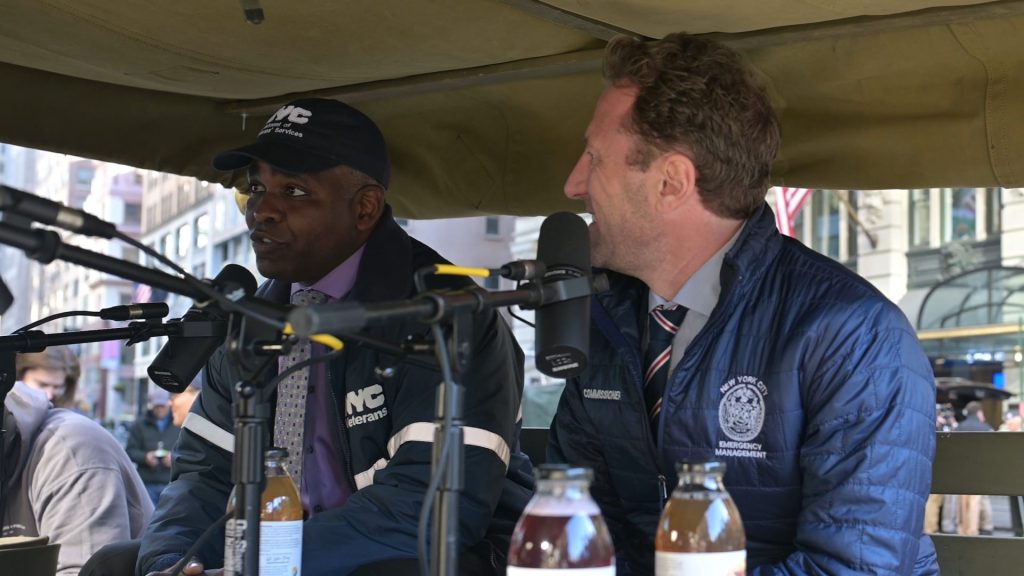
It’s love. For me, when you strip aside all the circumstance, all the uniforms, and all the songs, it’s this outpouring of love to the veteran community, and so I love that. Also, what excites me on this parade, Fran, Drew, and Zach is when you walk down 5th Avenue and you see people from all walks of life saying thank you to our veterans. That’s what gets me high.
I couldn’t agree more, and then also, we are both dads. It’s the hardest job. We have the most important job that we have. Also into mental health. It’s so sensitive and strong making the pitch here for you, Drew. This is a week between the Marine Corps birthday and Veteran’s Day when we get to expose our kids to service in all its different forms. The military is one vehicle for that, but it’s an opportunity to talk to them about that and impress on them the importance of service.
It’s the next generation of leadership. Gentlemen, thank you so much. Thank you for what you are doing for the city. Thanks for what you are doing for veterans.
Happy 248th birthday to the Marines. Happy Veterans Day.
Thanks so much.
It’s great to see you, guys.
—
The best part about the New York City Veterans Day Parade is that anybody can show up and they will let anybody in. Nick Angione is here. He is the Chairman of the United War Veterans Council and the host and producer of the New York City Veterans Day Parade. Nick, I’m so glad you stopped by. I wanted you to come and see us. I ran into you earlier. Mark is going to join us later, but let’s talk about the 104th running. Where are we at?
We had a perfect weather day, which is the only thing you can’t control. No rain and no sleet, and beautiful sunny skies. We had the mayor come to give his sendoff. He spoke well so passionately and eloquently. We have about 20,000 to 25,000 folks that are going to move. It’s a little thing we do every year for the veterans. We tried to put something together. Everybody is happy. Veterans of all ages. We have World War II Veterans. We have Vietnam Veterans and we have veterans from the Gulf War. Everybody is here. Everybody is welcome.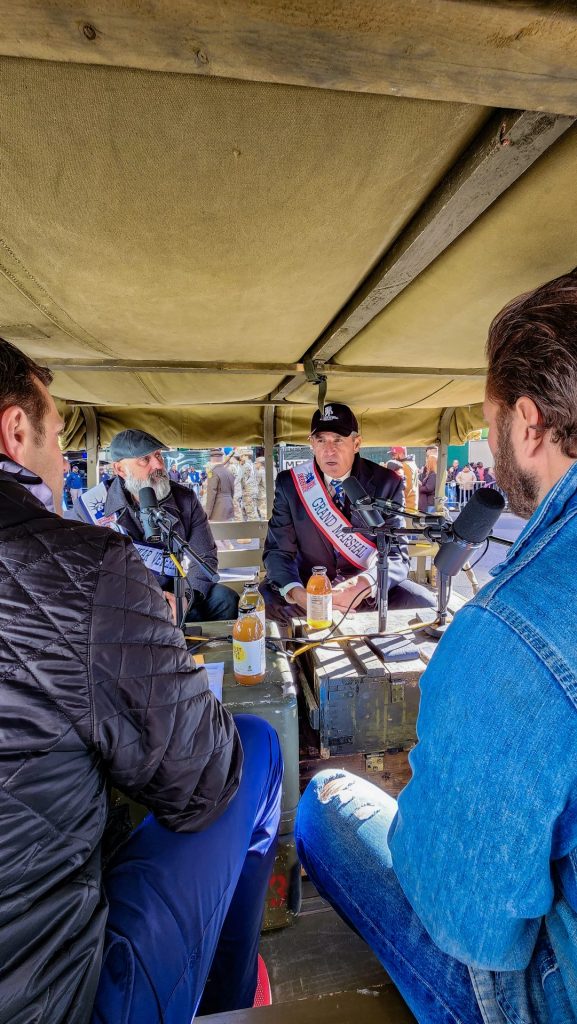
We were talking before you hopped in about the fact that the parade starts not with veterans. It starts with the first responder community in New York City. Why do we do it that way?
This entire day is dedicated to veterans. What we want to do by putting them up front is show that they may not be veterans at the moment, but they are the next generation of veterans. They are the next generation that we want to impress upon them. Not to impress them with a parade, but to impress upon them the gravity of what this is all about. We send them out first. We send them up front. They are always having a good time. Hopefully, when they go home, they tell their friends and it proliferates, and that honor and respect towards veterans from above and below is what we are trying to get.
You caught Fran off guard. He was talking about first responders, but you were talking about the youth. It started with the youth and that was an interesting thing to me. I love that answer. Your other question was about the first responders.
As we are talking here, now we have the bagpipe for the state police. As we are talking now, we got the bagpipes coming by from the state police unit. Again, more in that first responder community that we put up front on the Veteran’s Day Parade.
In that genre, you have your military veterans in law enforcement. They go hand in hand a lot of times when guys get out of the military, regardless of branch and regardless of level of service. You don’t have to be a combat Purple Heart. Any veteran is welcome to the parade, but you see a lot of veterans in the LEOs and the Law Enforcement. We honor both the city that we are in right now and its veterans. They are protecting us. They are back overseas. The NYPD gives us an enormous amount of resources to not only secure the parade route, but they are in the parade themselves. Some of the sharper-dressed military police we have here are the state troopers of New York.
Those purple accents are awesome. I’m curious because I’m a I’m a therapist. I’m also a guy that likes to get into people’s heads. You led with a beard which I love. You are running the parade. A parade is a thing we grew up with. There’s such a tradition of sitting on the side watching and remembering as a kid all of these, especially the lights of the police cars. What about you and your personality drew you to this?
The reality is that the catalyst of why I’m here wasn’t the parade. The catalyst for why I got involved with the United War Veterans Council was the health and wellness program that we produce. We have a health and wellness program that we do every week. It’s not about like a once-a-week thing or a once-a-month thing. Our goal was to try to get folks in basements, not having a good time in their head. They needed to get outside. That was the catalyst for me. When I realized that the United War Veterans Council does run the largest Veterans Day parade in the entire nation, that’s where the twelve-year-old boy came out in me. That was the lights in the fire trucks. I get to wear a sash.
The answer to that question is the catalyst was service and then this is the blank. This is a lot of fun. The preparation for this is daunting when you think about it. We are a not-for-profit. We don’t have tons of people. We have an unpaid board that I’m the chair of, but then we have only four executive members. Mark Otto is the president and executive director. He’s only got 3 or 4 people under him, and one of those is not paid. It is a passion of everybody. They put this thing together, and once we get it off, it’s autopilot. Now we can play again.
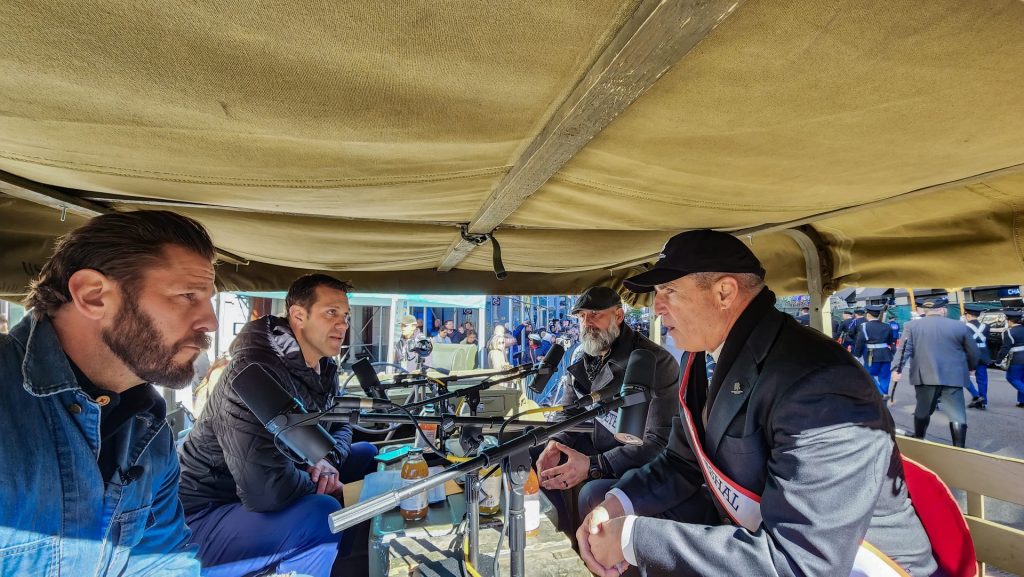
I want to give a shout-out because you brought it up to your team. I’m fortunate we have said it a lot. I say a lot that you and I came into the United World Veterans Council at the same time. I had the opportunity to serve as a treasurer for a couple of years, and you were elevated from your board role Into the chairman role after.
We continue to support UWVC and continue to support the parade. That is something that’s important to me and The Jedburgh Podcast and everything that we are doing, but Ryan Hegg has been here for many year for the production of this parade. You talk about a small team. In many respects, there are a lot of people who support Ryan, but at the end of the day, this is the Ryan Hegg show.
He’s the tip of the spear. Even if you catch a glimpse of him, he’s got three radios going, “Who wants this? Who wants that?”
He’s got a tactical vest on. He’s got radios.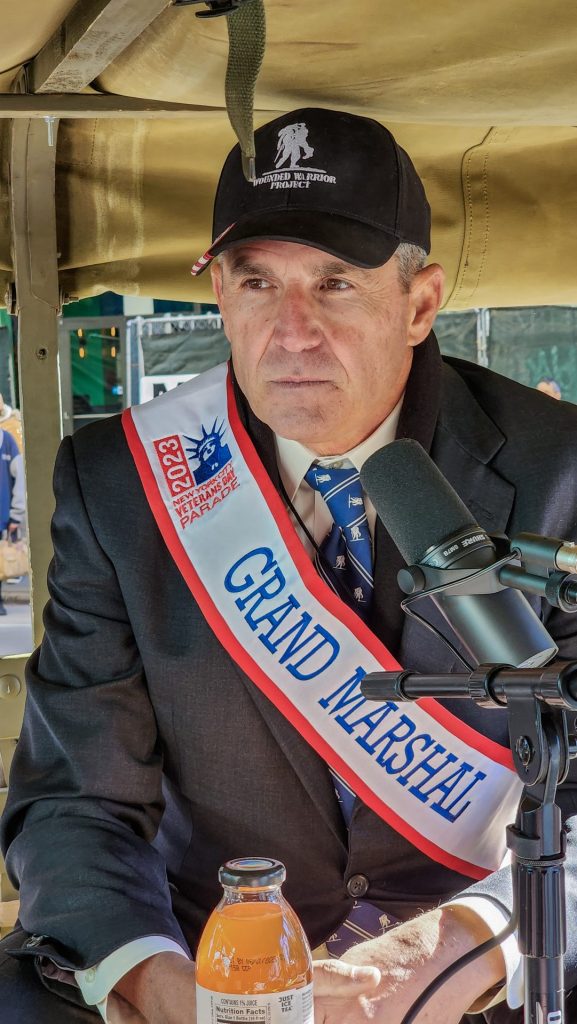
He got on comms with everybody up there. Ryan leads the logistics and administration for the parade. He also is in charge of our historical program for legacy information and legacy learning from World War I. The guy is on all the time, but these are one of those days where I look at him and go, “You good?” That’s what I’m going to say. That’s it. I moved away. I’m like, “I don’t want to get caught up.” He’s got it all under control.
When I saw him, the first thing I’d even say Hi. He looked at me. I gave him a hug. I said, “This one here.” It was still dark out. “I will give you a hug. Good luck to you. You are going to crush it.” Here we go. This is your favorite Marine. This is the United States Army Band. Pershing Zone is crossing by us playing the Army song. Sing it, Marines.
I’m coming behind the band in the salute to the US Army. We have the Army Chief of Staff General George here. It’s incredible. I am hopefully convinced and done my work well enough. We are going to see hereafter to convince him to come sit down with us for a little bit. I had his team over here earlier giving him the, giving them the spiel. They seem very interested in it. I’m hoping we are going to get him in.
That’s the other thing too. I will tell you, Fran. We are the largest Veterans Day Parade in the nation because we have run this now for so many years. I’m going to knock on wood, but I’m also going to tout and pat our collective selves on the back. We have had no hitches. We had a sitting active president here.
That was the game kind decision, bulletproof glass, and all that good stuff. Again, sitting presidents and dignitaries from overseas are off without a hitch. Everyone regardless of their political views understands that this is not about any of that. This is about veterans and honoring them and saying, “Thank you.” It’s Memorial Day. It’s thank you for your service and let’s go play.
[bctt tweet=”This is about veterans and honoring them and saying thank you.” username=”talentwargroup”]
We have a shout-out by a Grand Marshall.
That might have been his way of saying, “I’m not coming on.”
He’s got a busy day. We were fortunate to have General Linnington out here. Wounded Warrior Project. Will Williamson is going to come on a little bit later, and we are going to talk about the impact that the Wounded Warrior Project has. In terms of the production of the parade, the Wounded Warrior Project is one of the main backers and supporters.
They have always been a supporter of us, but they came out strong this year in support with not only financial support, but they have hundreds of people down here this year. It’s great to see that they understand the level at which we produce the parade. If it was a couple of guys and gals getting it done, I don’t think we’d have the participation that we do. Everybody realizes that this is probably one of the best-run parades in Manhattan. I know that’s a big statement because there are a lot of parades in Manhattan, but the reality is we probably move the most people in the most controlled pandemonium of any other parade. We are proud of it.
When I asked you that question about what brought you to the parade, you did talk about the wellness program. What’s your wellness program? That’s cliche, but as a therapist, the question I get a lot is, do you have a therapist? I do. I see a guy who’s aware of himself. Even how you are physically manifesting yourself. What are ways in which you take care of yourself emotionally?
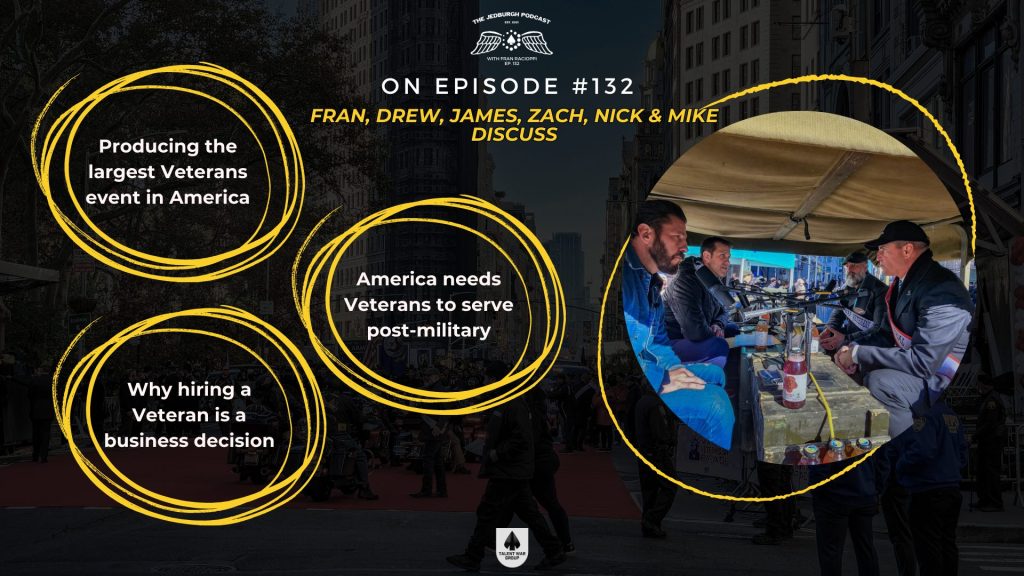
It took a long time to get to a place where I even knew that I needed to. I was in the United States Corps.
That’s the army band. He’s talking about being a Marine. We are going to bring the Army band by in.
I served in the Marine Corps from ‘91 to ‘95 as a reconnaissance Marine, Second Recon Battalion. First Gulf War, mostly Somalia was where I went to work. When I got out in ‘95, I didn’t even know that I needed that. I thought this is how you are supposed to think. This is how you are supposed to feel and this is what you are supposed to say, which is nothing.
It probably wasn’t until I started guiding involved with UWVC that I started to get into the community that was seeking some comfort and conversation and stuff like that. To answer your question, it wasn’t until probably into my 30s or early 40s that I was like, “It doesn’t have to be this way. We don’t have to hold onto these things.”
That for me was the catalyst when I got involved in the UWVC and got involved in that health and wellness program. Another organization that I was involved with before or in parallel was Team RWB. Another organization that does great work with veterans. Not only veterans but veteran supporters and stuff like that. That was my catalyst.
I would like to say that the military is doing a better job in letting people know when they get out when they EAS that it’s not like, “Thanks for service. Here’s a kick in the ass and figure it out.” There are programs and places that you can go right after. That doesn’t mean any sign of weakness either. It’s a, “We got to do a thing.” We did a thing. We have that burden to bear. We have that pride, that privilege of serving, but now we can do something else together and we got to find our little tribe and help each other out.
General Lennington has joined us. He heckled us as he as he drove by. Thanks for coming in for the second year in a row. Amazing to have you back. When you drove by, we started talking about the Wounded Warrior Project. We started talking about their support of the parade. As Nick mentioned, the support that they provide to veterans through their transition in so many different ways. Unlike, last year where you were a spectator and a supporter, you are the grand marshal this year. Talk for a second about being the grand marshal and what that means to be in New York City.
As I said over at the Plaza when we laid the wreath, there were sixteen-plus million veterans across the country. I’m representing them. It’s a huge thrill for me to be the grand marshal. Don’t get me wrong, but now is not about me. It’s about the sixteen million that have said, “Take me,” when their country needed the most, and it’s about the two million serving and all the branches, active Garden Reserve around the world. As you heard the chief say, we have 150,000 soldiers alone deployed around the world right now.
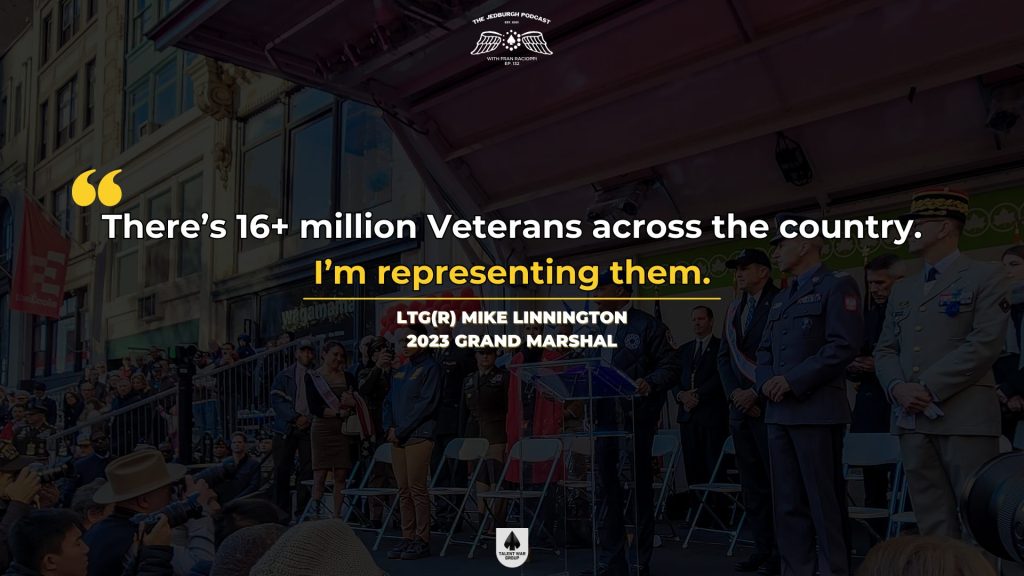
They are in harm’s way. As we celebrate Veterans Day, we think about them. We have incredible veterans. We should never forget what our veterans have done for our country, and the young people out there who are listening to your podcast ought to consider military service. It’s a calling and it’s a way of life, and you learn it. You learn about yourself and you learn leadership. You learn everything. It’s a great thing.
[bctt tweet=”We should never forget what our veterans have done for our country.” username=”talentwargroup”]
I want to ask you about developing leaders from day one. I have spent a lot of time talking about the fact that the military, the Army specifically a little bit the Marines, but the Marine Corps recruiting is awesome.
The best. It’s the blues.
We talk about developing leaders from day one, and great organizations do that. That’s why organizations like the Army get it right. When you go into a recruiting station, we are saying, “You are a leader.” You are a leader from that moment on. We are not saying, “When you are a sergeant. Now, you are a leader,” because we have to be able to empower people to make decisions. Talk about leadership from day one, how that builds great organizations, and why the Army is the best at that.
At the end of the day, you look at what the Army and all of our military services have done the last twenty years, in particular, in an asymmetric battlefield, you can’t wait to be told what to do. You got to understand your commander’s or boss’s intent, and then you got to be able to act when it’s time to act.
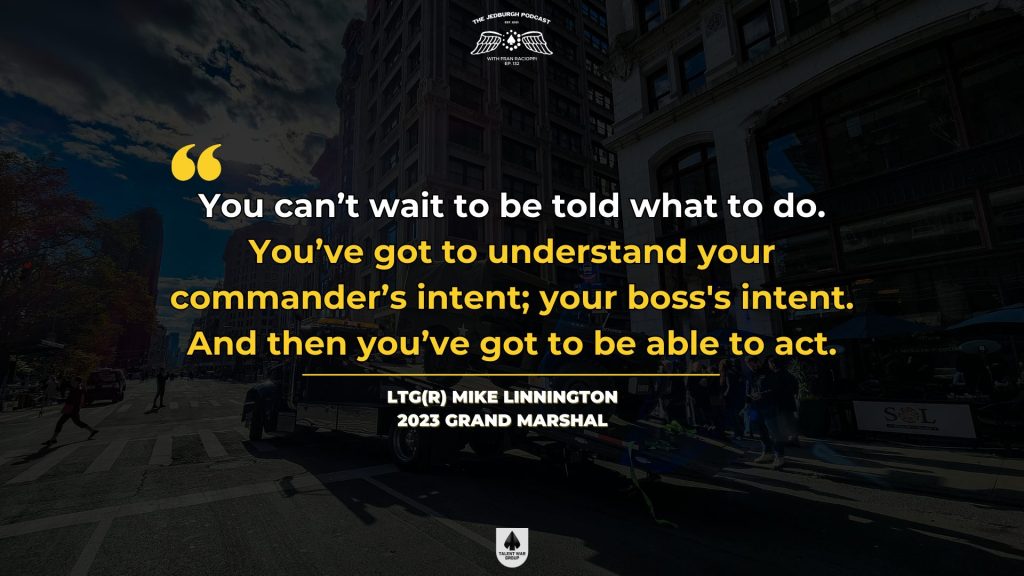
It’s fallout one. We have always practiced fallout one drill. Mission Commander is all about empowering those from the top to the bottom to understand the outcomes you are trying to achieve and then turn them loose. We have a chain of command, but in an asymmetric battlefield, the individual’s initiative of the service members is what matters most. It starts with first contact with your recruiter at the MEP station or the recruiting station, getting off the bus with your drill sergeant. Everybody remembers their drill sergeant’s voice. It’s about values. At the end of the day, it’s about leadership and values. If you come into the military with the wrong value system, I guarantee you leave with a different set of values. It’s not about you, it’s about the team, and it’s about doing whatever is asked of you when times are most difficult.
It’s important too when we talk about the leadership that’s developed is that the military is developing leaders for their time and service, but there’s almost a more important part of that leadership of when veterans transition. We had Commissioner Hendon and Iscol a little bit ago. Two veterans who are now serving New York City and taking all the leadership that they learned and bringing it to society. We need our veterans to get out and lead society because that’s such a part of our culture. Think about the book 1776 by David McCullough where those farmers served and went back and then built this country.
I have done probably half a dozen events with corporate leaders who are thirsting for military service members to join their organizations. They need that leadership. You can have the best schooling and training in the world. Education is important, but if you don’t have that leadership, they are looking for military leaders of all ranks to join them.
Commissioner Hendon and Iscol are two examples of veterans who have been through the crucible and now are in a different crucible, and they are serving no differently than they served when they first joined the military. For folks who are tuning in to this, hiring a veteran isn’t a charity endeavor. It’s a business endeavor. If you want to improve your business, hire veterans. I’m very proud to say, for the first time in a long time, that veteran unemployment is less than the national unemployment rate, and that’s because every organization has realized the value of veterans and they all want to get them.
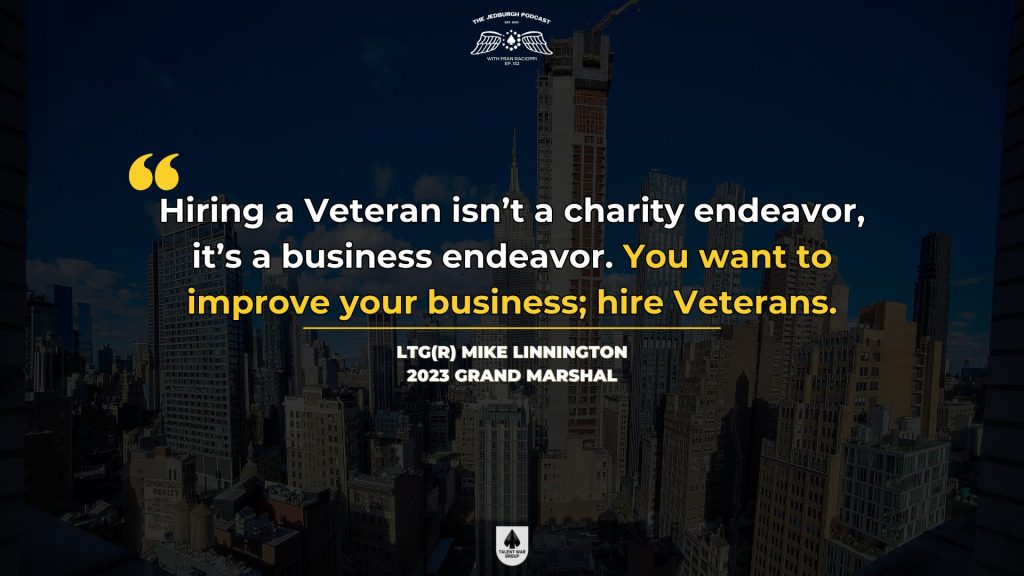
I want to touch on something you had said about if you go into where’s the Army or military in general. If you don’t have the right morals or principles, you are going to come out with a better set of them. That’s something to proliferate out to the whole nation, whether it’s the military side or not. You can come from a broken family, you can come from a single mom, you can come from an orphanage without the correct parents.
If you are lost and you have a passion for serving. Once you get into the military, you will almost naturally gain that respect of self. Self-confidence and camaraderie for others. The team set mentality. That’s what businesses want. They don’t want rogue recon Marines jumping out there and doing the thing whether or not in tune with the ultimate command. Those were a recon ranger. I had to throw that one in there. The idea is that you are going to come from a macro approach to life to you are going to join the military and now you are going to have a single point of focus and you could dial in. You get the skills and camaraderie. That should be impressed upon people.
You are doing great. You are arms are going to be sore by the end of the day so you got a lot of things you need to do.
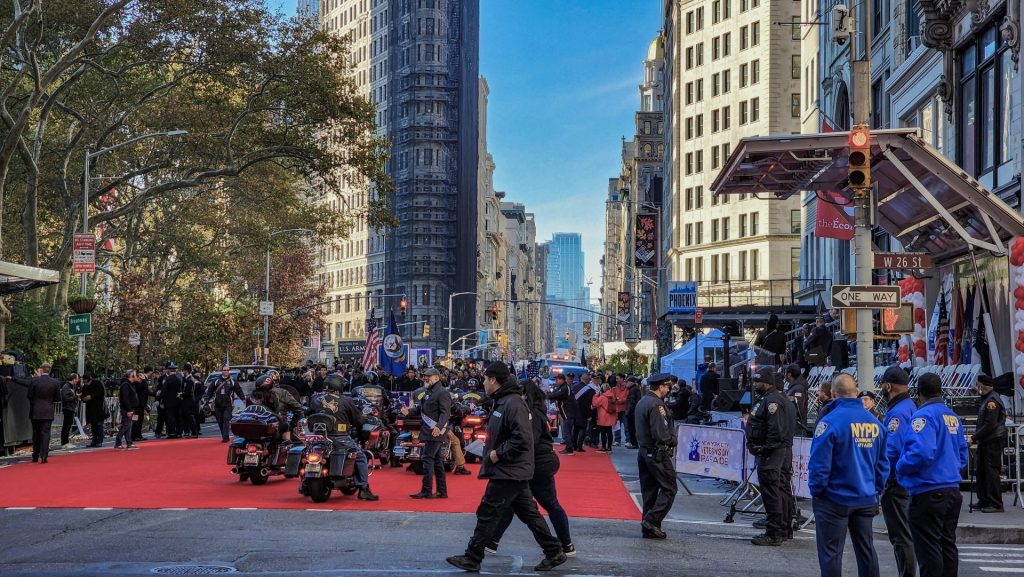
Thank you for what you guys do. Continuing to inspire people all over the world, and all over the country about what veterans bring to the table. It means a lot. With what’s going on in the world right now, you know the next one is coming, and we need young people willing to serve and have great respect for those who are in uniform. Thanks for having me on.
Thank you for joining us. Have a great day.
—
The American Jedburghs went out to form the foundation of the United States Special Forces and the Special Activities Director to the Central Intelligence Agency. Thanks for tuning in to The Jedburgh Podcast. I’m your creator and host Fran Racioppi. Join us next time for a new episode on Apple, Spotify, or wherever you get your podcast. Check us out on YouTube for full episodes, highlights, and other behind-the-scenes content.
If you like what you heard, give us a like and leave a review. Follow @JedburghPodcasts on all social media. Follow me, Fran Racioppi, Drew Newkirk, Talent War Group, and our partners, Just Ice Tea and Longtab Brewing Company on Instagram, Facebook, Twitter, X, and Threads. Send your comments and inquiries to Fran@JedburgPodcast.com. As a former member of Special Forces, the The Jedburgh Podcast donates a percentage of all proceeds to the Green Beret Foundation, supporting America’s special forces and their families. Thanks for joining us on this episode. How you prepare today determines success tomorrow.
